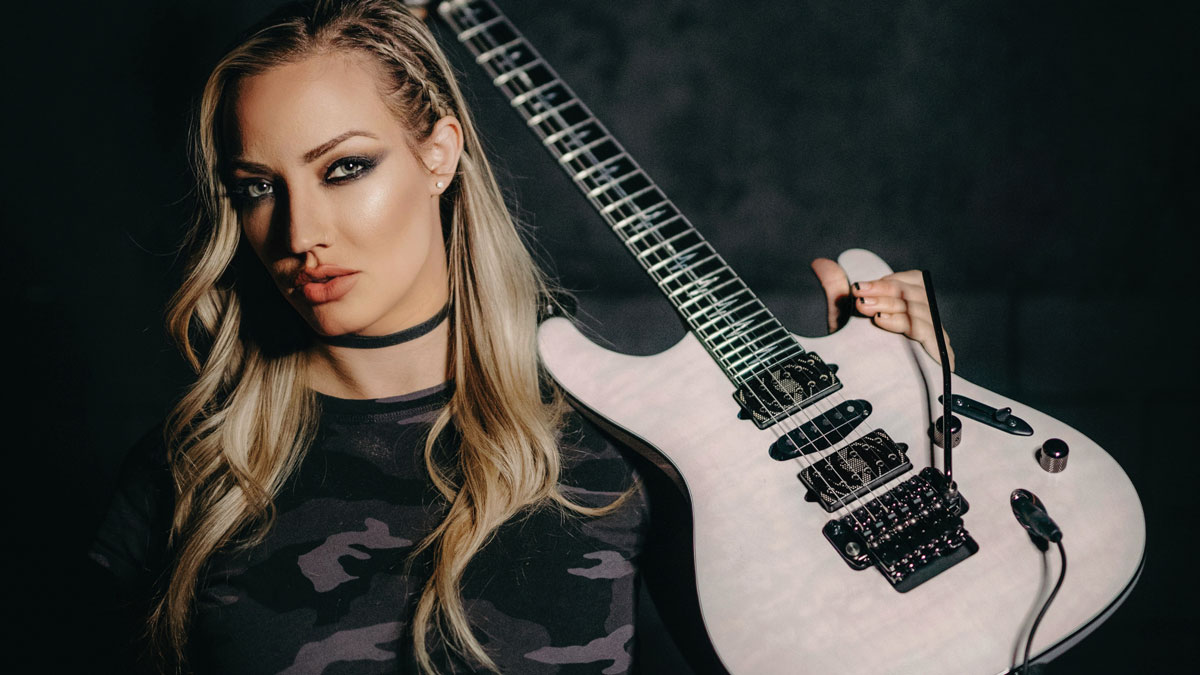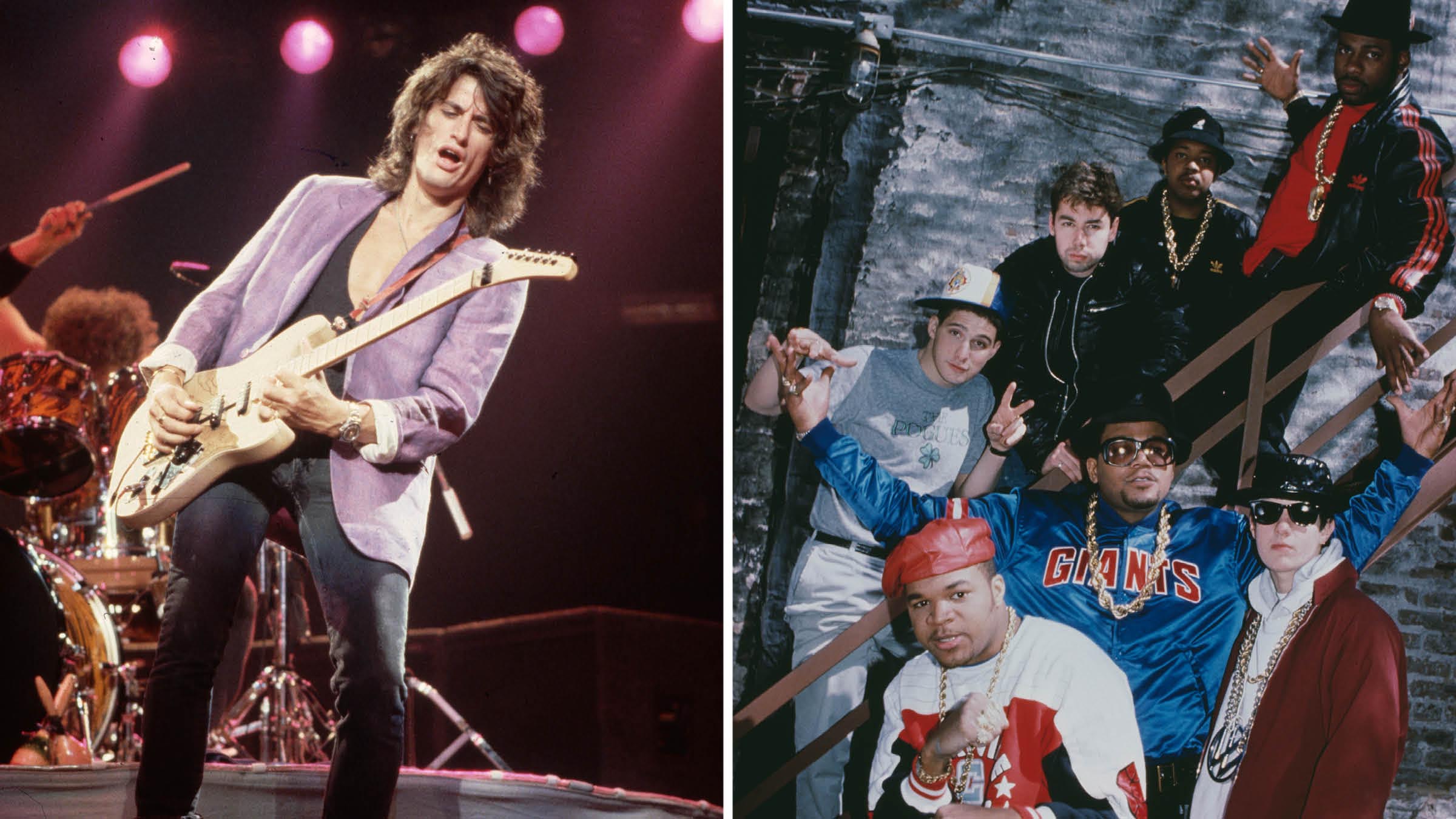Nita Strauss: “Any time you’re playing guitar, you’re improving, no matter what it is – whether you’re playing power chords or technical metal”
The Ibanez signature artist made the very public shift from Alice Cooper’s band to Demi Lovato’s band this year, but she’s so much more than “someone else’s guitar player”

All the latest guitar news, interviews, lessons, reviews, deals and more, direct to your inbox!
You are now subscribed
Your newsletter sign-up was successful
Type Nita Strauss’s name into a search engine and you’ll find endless links about her longtime gig with Alice Cooper and new post with Demi Lovato. But Strauss is much more than a side person. She’s a songwriter, session musician, clinician and solo artist with a unique array of credits ranging from movie soundtracks to the WWE.
Strauss joined Cooper’s touring ensemble in 2014. After eight years, it seemed like the ideal setting to showcase her loud and proud technique. Instead, she stunned fans earlier this year by accepting the Lovato gig. While this announcement dominated headlines, no less significant is news of her long-awaited second solo album, scheduled for release in 2023.
The focus is often on your work with other artists and not as much on your solo career. With a new album coming up, how do you redirect the attention, and is it frustrating to have to do so?
“It doesn’t bother me too much, because playing with other artists has been the majority of my career. It also speaks to one of the main reasons I thought it was necessary to take a step out and make a change in my day job, so to speak.
“I want to be myself. I want to have my own identity and my own brand. I do have my solo music and a new album in the works, and if I’m just known as one person’s guitar player for the rest of my life, that counteracts what I’m trying to do. So I think all I can really do is keep touring my solo band when I’m off the road with other artists, keep releasing new music, and at the end of the day, if I’m in the conversation, I’m happy.
What does “being someone’s guitar player” require?
“Playing with the artists that I do, I’m not technically a band member. Being a hired gun, it’s really 'step in and fill this role,' whether it’s playing Alice Cooper songs or reimagining rockers from Demi Lovato songs. What I bring to each of those different gigs is that sense of professionalism I’ve learned across so many years, and how to step into each role, fill it nicely and tightly, and help bring that artist’s vision to life while still bringing my own personality and energy to the show.
All the latest guitar news, interviews, lessons, reviews, deals and more, direct to your inbox!
“I have learned so much from Alice and Demi. One of the things they both do really well is they take the forefront, but they give each band member an introduction and time to shine. They don’t take the entire spotlight for themselves. That’s something I try to do with my solo band as well, to make sure it’s a collaborative effort and everybody knows it.”
What can you tell us about your new album?
“I’m a really emotional musician and person, and I write about what I’m feeling and what’s going on in my life. Making this album, and especially doing a lot of the writing during 2020, when everything was shut down and uncertain, brought out a lot of emotion in my songwriting.
“I’ve grown a lot as an artist and songwriter since Controlled Chaos came out in 2018, and I’m excited to show a higher level of playing and more depth and maturity in these new songs. I’ve improved a lot as a musician, my technique has gotten better in the last four years, and I’ve gotten more comfortable in my own style, so I feel I’ve come into my own as a guitar player.”
How does working on other artists’ material strengthen your chops?
Playing straightforward rock songs has given me a much better sensibility of song structure and not playing too much
“First of all, any time you’re playing guitar, you’re improving, no matter what it is. Whether you’re playing power chords or technical metal, if you’re playing guitar, you’re getting incrementally better each day. Playing straightforward rock songs has given me a much better sensibility of song structure, and not playing too much, or adding too much, and all these things guitar players do just because we like to show off and have fun! It has taught me a lot about letting the song breathe.
“Simplicity is key in a lot of Demi’s songs, especially the older ones, which were originally pretty straightforward pop songs that have been reimagined in this heavy-rock way. The simple, catchy chords are still there, and it’s finding things that work around the melodies, because melody is king in pop and rock songs. It’s about finding that simplicity and embracing it, rather than saying, 'This is only four chords. I have to play a bunch of notes over it.'”
You have signature models with Ibanez. What makes its guitars right for you?
“Like so many guitar players, every time I got a new guitar, there was always something that wasn’t quite perfect. 'I love it so much, but I have to put different pickups in it' or 'I love it so much, but if only it had an ebony fretboard.' If only it was this, if only it was that. When I had the chance to design the JIVA with Ibanez, I already had all my dream specs in my head because I’d had so many different guitars. I knew I wanted a mahogany body, a quilted maple top and an ebony fretboard. I knew what I wanted the pickups to sound like.
“I wanted a guitar that screamed 'me', and that’s what we got with the original JIVA 10 with the black-to-blond burst. We expanded to the JIVA JR, which I call the 'beach burst' because it goes from black to blue to blond. Now we have the JIVA 10L and two JIVA X2 models – the original black one and the new JIVA X Ghost, which is the white one I use onstage. It’s my favorite guitar.
For me, writing music for a vocalist is infinitely more challenging. I come from the world of instrumental music
“I only play my signature guitars, not just because I designed them, but because I feel I designed the perfect guitar for my playing style. It’s fast, it’s light, it’s versatile. It can shred, it can go clean, it can go rhythm. So that’s my weapon of choice 100 percent of the time.”
Is instrumental music more challenging in terms of communication, since there are no lyrics, or is it more universal, in that it’s open to interpretation and the listener can simply let the music take them wherever it leads?
“For me, writing music for a vocalist is infinitely more challenging. I come from the world of instrumental music, where you can play what you’re feeling, evoke those emotions through note choices and chord choices, and there’s no limit to it.
“When you get vocals involved, you’re thinking about the singer and their range, how many syllables you can fit in this line without it sounding weird, and does the end of this phrase rhyme with the end of the phrase after it. There are so many rules you have to follow in order to make a catchy radio song, let’s say. So I find it a lot more limiting to write music for a vocalist.
“At the same time, it’s a great challenge, it’s a fun challenge, it’s one I’ve embraced a lot, and while it might not be as subjective as instrumental guitar music, I think it’s definitely its own beast.”
Alison Richter is a seasoned journalist who interviews musicians, producers, engineers, and other industry professionals, and covers mental health issues for GuitarWorld.com. Writing credits include a wide range of publications, including GuitarWorld.com, MusicRadar.com, Bass Player, TNAG Connoisseur, Reverb, Music Industry News, Acoustic, Drummer, Guitar.com, Gearphoria, She Shreds, Guitar Girl, and Collectible Guitar.
